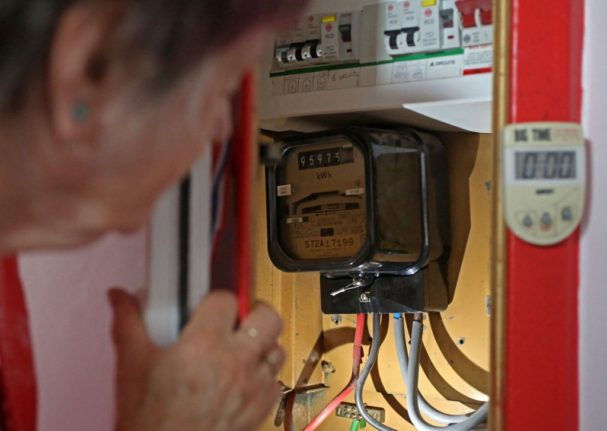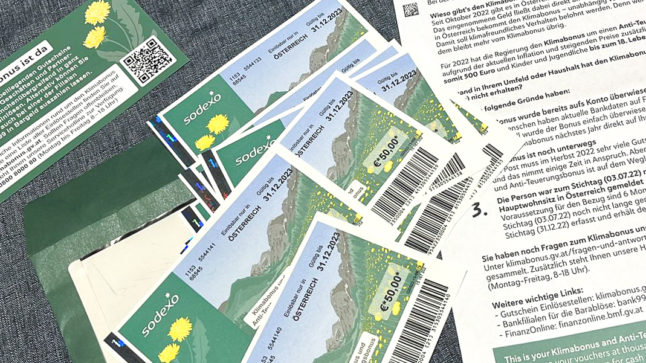Austria’s federal government will provide a €2 billion credit line to the Viennese energy supplier Wien Energie after the company fell into some financial trouble last week, chancellor Karl Nehammer (ÖVP) said in a press conference on Wednesday.
The sharp rise in wholesale prices for gas and electricity has put the supplier Wien Energie in financial difficulties, according to Austria’s Finance Minister Magnus Brunner (ÖVP).
“Vienna Energy approached us over the weekend with the request that we meet urgently because they have fallen into a financial emergency,” the minister told ZIB2 on Sunday.
READ ALSO: Where are energy prices going up (again) in Austria?
On Monday, the Ministry of Finance released a statement explaining the situation. The ministry said that Wien Energie still has sufficient financial resources to secure future supply contracts, but it would need €6 billion to “conclude transactions on the energy exchange”.
Later in the week, the state company ensure consumers that supply was secured and said that as prices dropped, so did the security deposits and the cash it needed. The company, the City of Vienna, and Austria’s federal government then agreed on a €2 billion credit line for Wien Energie.
READ ALSO: ‘The supply is secured’: Vienna to audit energy firm after price shock
What happened?
The company, which is state-owned by the City of Vienna, said that to ensure customers’ supply, it carries out trading transactions on energy exchanges. But, like all other stock exchange participants, it has to pay a “security deposit”.
Aufgrund aktueller Medienberichte:
Nein, Wien Energie ist nicht insolvent/pleite.
Um Versorgung der Kund*innen sicherzustellen, führt Wien Energie Handelsgeschäfte an Energiebörsen durch. Dabei muss das Unternehmen – wie alle Börsenteilnehmer – Sicherheitsleistungen hinterlegen.— Wien Energie (@WienEnergie) August 28, 2022
This is where the firm has run into trouble. “Because electricity prices exploded again across Europe on Friday, these necessary security measures have increased unexpectedly,” the firm said.
That means that as prices sharply rose, the payment it needed to participate in trading also escalated.
However, Wien Energie added, this “collateral” it needs to pay “comes back once the trades are settled”, just like a security deposit would.
READ ALSO: Vienna to handout €200 payments to counter rising energy costs
“Wien Energie & Wiener Stadtwerke are solid, economically healthy companies with excellent credit ratings,” the company added.
Why does Wien Energie trade in the energy market?
Energy is traded on the European stock exchange, where companies can make transactions in the “futures market”. This basically means that you can buy and sell energy today, but the actual delivery will only take place in the future.
Wien Energie sells electricity from its power plants up to two years in advance while it buys electricity and gas on the stock exchange for its customers in the long term, the company explained. It does that to protect itself – at least to a certain point – against future price fluctuations.
Trading in futures allows the company to close a deal at a specific price, even if the product will only be delivered years later. This way, Wien Energie (and other companies that do the same) can estimate energy prices for customers and power plants for the next few years.
READ ALSO: Energy crisis pushes nuclear comeback in Europe
“This increases planning security and is a proven tool for risk management in the energy sector,” the company added.
When prices explode, however, like what happened last week, as the cost of electricity in retail rose from €700 to around €1,000 in just one day, the security deposit to participate in those trades also went up.
What has been decided?
After talks between the federal government and Vienna, the federal government agreed on a special €2 billion credit line for the company to cover it in the future if prices unexpectedly soar.
A credit line works like a loan, but the money is not sent directly to Wien Energie. Instead, it is left available for the company to draw if necessary. The City of Vienna said that the company doesn’t need the cash “from today’s perspective”. However, the credit line would provide a “security to cover extreme outliers on the electricity exchange”.
“In any case, the federal government has the instruments and the will to help the city of Vienna in this financial emergency. It is about the security of supply for two million people, which must be guaranteed.”, the Finance Ministry said.
It added that it is considering a loan “in the billions”, which the Austrian Federal Financing Agency would handle.



 Please whitelist us to continue reading.
Please whitelist us to continue reading.
Member comments